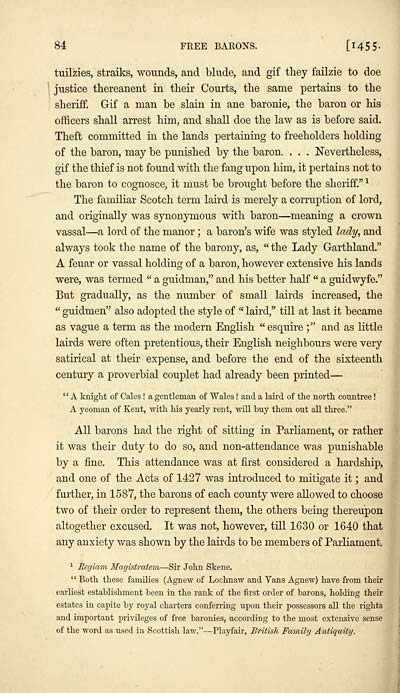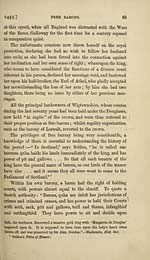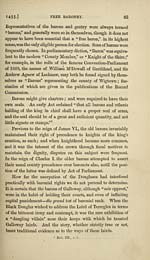Agnews of Lochnaw
(116) Page 84
Download files
Complete book:
Individual page:
Thumbnail gallery: Grid view | List view

84 FREE BARONS. [1455-
tuilzies, straiks, wounds, and blude, and gif they failzie to doe
justice thereanent in their Courts, the same pertains to the
sheriff. Gif a man be slain in ane baronie, the baron or his
officers shall arrest him, and shall doe the law as is before said.
Theft committed in the lands pertaining to freeholders holding
of the baron, may be punished by the baron. . . . Nevertheless,
gif the thief is not found with the fang upon him, it pertains not to
the baron to cognosce, it must be brought before the sheriff." *
The familiar Scotch term laird is merely a corruption of lord,
and originally was synonymous with baron — meaning a crown
vassal — a lord of the manor ; a baron's wife was styled lady, and
always took the name of the barony, as, " the Lady Garthland."
A feuar or vassal holding of a baron, however extensive his lands
were, was termed " a guidman," and his better half " a guidwyfe."
But gradually, as the number of small lairds increased, the
" guidmen" also adopted the style of " laird," till at last it became
as vague a term as the modern English "esquire ;" and as little
lairds were often pretentious, their English neighbours were very
satirical at their expense, and before the end of the sixteenth
century a proverbial couplet had already been printed —
"A knight of Cales ! a gentleman of Wales ! and a laird of the north countree !
A yeoman of Kent, with his yearly rent, will buy them out all three."
All barons had the right of sitting in Parliament, or rather
it was their duty to do so, and non-attendance was punishable
by a fine. This attendance was at first considered a hardship,
and one of the Acts of 1427 was introduced to mitigate it ; and
further, in 1587, the barons of each county were allowed to choose
two of their order to represent them, the others being thereupon
altogether excused. It was not, however, till 1630 or 1640 that
any anxiety was shown by the lairds to be members of Parliament.
1 Begiam Magistratem — Sir John Skene.
" Both these families (Agnew of Lochnaw and Vans Agnew) have from their
earliest establishment been in the rank of the first order of barons, holding their
estates in capite by royal charters conferring upon their possessors all the rights
and important privileges of free baronies, according to the most extensive sense
of the word as used in Scottish law." — Playfair, British Family Antiquity.
tuilzies, straiks, wounds, and blude, and gif they failzie to doe
justice thereanent in their Courts, the same pertains to the
sheriff. Gif a man be slain in ane baronie, the baron or his
officers shall arrest him, and shall doe the law as is before said.
Theft committed in the lands pertaining to freeholders holding
of the baron, may be punished by the baron. . . . Nevertheless,
gif the thief is not found with the fang upon him, it pertains not to
the baron to cognosce, it must be brought before the sheriff." *
The familiar Scotch term laird is merely a corruption of lord,
and originally was synonymous with baron — meaning a crown
vassal — a lord of the manor ; a baron's wife was styled lady, and
always took the name of the barony, as, " the Lady Garthland."
A feuar or vassal holding of a baron, however extensive his lands
were, was termed " a guidman," and his better half " a guidwyfe."
But gradually, as the number of small lairds increased, the
" guidmen" also adopted the style of " laird," till at last it became
as vague a term as the modern English "esquire ;" and as little
lairds were often pretentious, their English neighbours were very
satirical at their expense, and before the end of the sixteenth
century a proverbial couplet had already been printed —
"A knight of Cales ! a gentleman of Wales ! and a laird of the north countree !
A yeoman of Kent, with his yearly rent, will buy them out all three."
All barons had the right of sitting in Parliament, or rather
it was their duty to do so, and non-attendance was punishable
by a fine. This attendance was at first considered a hardship,
and one of the Acts of 1427 was introduced to mitigate it ; and
further, in 1587, the barons of each county were allowed to choose
two of their order to represent them, the others being thereupon
altogether excused. It was not, however, till 1630 or 1640 that
any anxiety was shown by the lairds to be members of Parliament.
1 Begiam Magistratem — Sir John Skene.
" Both these families (Agnew of Lochnaw and Vans Agnew) have from their
earliest establishment been in the rank of the first order of barons, holding their
estates in capite by royal charters conferring upon their possessors all the rights
and important privileges of free baronies, according to the most extensive sense
of the word as used in Scottish law." — Playfair, British Family Antiquity.
Set display mode to:
![]() Universal Viewer |
Universal Viewer | ![]() Mirador |
Large image | Transcription
Mirador |
Large image | Transcription
Images and transcriptions on this page, including medium image downloads, may be used under the Creative Commons Attribution 4.0 International Licence unless otherwise stated. ![]()
| Histories of Scottish families > Agnews of Lochnaw > (116) Page 84 |
|---|
| Permanent URL | https://digital.nls.uk/94899506 |
|---|
| Description | A selection of almost 400 printed items relating to the history of Scottish families, mostly dating from the 19th and early 20th centuries. Includes memoirs, genealogies and clan histories, with a few produced by emigrant families. The earliest family history goes back to AD 916. |
|---|

